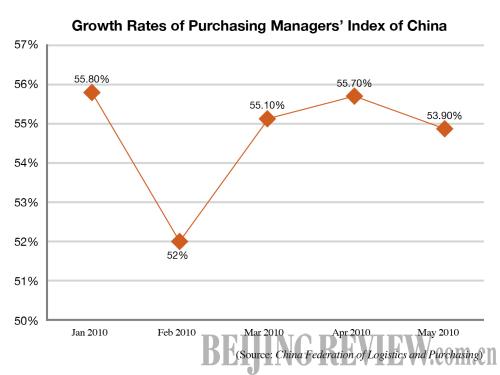| 
Numbers of the Week
786.5 million
The number of Chinese mobile phone users reached 786.5 million at the end of April, said the Ministry of Industry and Information Technology.
91.5%
China's industrial profits in the first four months this year rose 91.5 percent year on year to 978.5 billion yuan ($143.3 billion), said the National Bureau of Statistics.
TO THE POINT: China vows to press ahead with property tax reform, opening up the possibility of introducing the long-debated tax. The country will offer as much as 60,000 yuan ($8,784) in subsidies to each buyer of new-energy vehicles. China's steelmakers are reaping hefty profits, but doubts are gathering as ore miners look to raise prices. PetroChina tops the latest Financial Times Global 500 list, but many are suspicious about its actual competitiveness. Personal computer maker Lenovo gears up to expand its presence in emerging markets. China remains the most appealing investment destination for Canadian companies.
By HU YUE
Property Tax
The State Council on May 31 approved a national program to gradually push forward property tax reform, a signal that the long-debated tax may be already in the pipeline.
China has been running simulation programs since 2003 to prepare for the ad valorem tax, which would replace current levies based on property transactions.
There are reports that Shanghai will be the first to launch the reform, possibly imposing the tax on people with residential areas exceeding 70 square meters each, or a household with more than 200 square meters of living space.
Other details are unclear about the tax, but a report by the Australia and New Zealand Banking Group Ltd. (ANZ) estimated that it may generate 120 billion yuan ($17.6 billion) in revenues annually for the governments.
The tax may be 0.8 percent of the market value of properties and be levied on people with multiple homes, beginning with their second home, said Liu Ligang, an ANZ economist.
Chen Guoqiang, Director of the Real Estate Institute under Peking University, said the tax would deal a heavy blow to speculators, believed to be the culprits for sky-high home prices.
It will also deliver a boost to the fiscal income of local governments and wean their reliance on land sales, said Chen.
Ni Hong, a senior researcher with the Development Research Center of the State Council, agreed. "It is also a long-needed boon for bridging the widening income gap and ensuring economic health."
But China still has a long way to go before really collecting the tax as the government would have to decide whether to levy taxes on a per-person or per-family basis, as well as dealing with housing size and value, said Ni.
Green Incentive
The Chinese Government on June 1 announced that it will offer as much as 60,000 yuan ($8,784) in subsidies to anyone who buys new-energy vehicles.
The subsidies, which target plug-in hybrids and pure electric cars, would initially go on a trial run in five cities—Shanghai, Changchun, Shenzhen, Hangzhou and Hefei.
Based on the capacity of the battery packages, a 3,000-yuan ($439) subsidy is offered for each kilowatt-hour for green cars, with a cap of 50,000 yuan ($7,322) for plug-in hybrids and 60,000 yuan ($8,784) for pure electric cars.
The money would go to new-energy vehicle producers so that they could lower the vehicle prices to benefit buyers or leasing companies.
Also, the Central Government will offer 3,000-yuan ($439) subsidies for gasoline and diesel cars with 1.6-liter or less engines that consume 20-percent less fuel than current models.
Jia Xinguang, an independent auto analyst, said the favorable policy would offer an extra incentive for development of the eco-friendly vehicles—the electric car, in particular—but it doesn't mean it's the right time for widespread application.
The market counts on product quality, mature infrastructure, as well as a better understanding among consumers, which will take time, said Jia.
Steel Concerns
Drawing strength from a thriving economy, 77 Chinese steelmakers raked in a combined profit of 33.9 billion yuan ($5 billion) from January to March, compared with a loss of 4.1 billion yuan ($600.4 million) the same period last year, said China Iron and Steel Association (CISA).
But many wonder how much longer the steel furnaces can burn bright.
| 